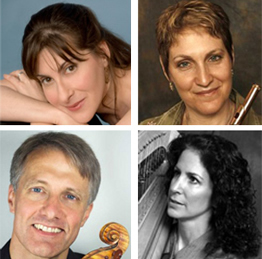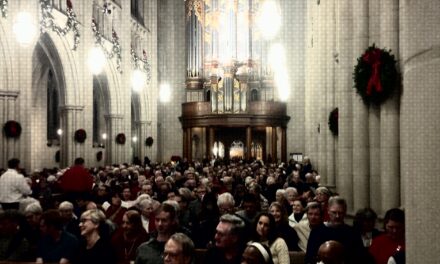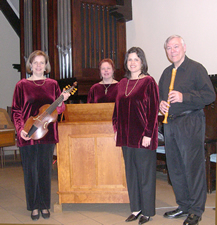It is a presumption that good parents should not favor one child over the other, at least not in an obvious manner. The same could be said about presenters of arts events with respect to their “children,” but every now and then it is obvious that one of the brood stands out as so special that the favoritism is evident. Prior to the first of a pair of concerts, Emil Kang, Executive Director for the Arts at the University of North Carolina at Chapel Hill, introduced this program, presented by Carolina Performing Arts, and his enthusiastic promise that this would be a very special performance proved to be grossly insufficient to describe its musical excellence and impact.
The Jazz at Lincoln Center Orchestra (JALCO), a jazz big band under the direction of trumpeter Wynton Marsalis, has made nearly annual visits to Memorial Hall on the UNC campus in the past decade, but this would be one that immediately breaks into the top five musical experiences of my life. Joining the JALCO was the 70-voice Chorale Le Chateau, conducted by Damien Sneed, in Abyssinian: A Gospel Celebration.
The origins of this work go back to 2008, when Marsalis composed this work to celebrate the 200th anniversary of the Abysinnian Baptist Church in New York City. This church is an integral part of both the cultural and religious life of Harlem and was the spoke of the wheel of the Harlem Renaissance of the 1920s and 30s. As somewhat of a lead-in and warm-up to this work, in 1992 Marsalis released In This House on This Morning, a similar gospel Mass setting that featured his septet plus voices. Abyssinian is a slightly enlarged and re-orchestrated version of the 2008 original, and Chapel Hill was the first stop on a 16 city tour.
Throughout the extraordinary career of Wynton Marsalis, one guiding principle has remained constant: he has never forgotten where he came from, musically. He has the remarkable gift of expressing himself in new and very personal ways while still retaining the essence of the ideas and musicians that paved the way in the early genesis of jazz. Abyssinian is a compendium of Dixieland, gospel, blues, slave songs, church services, big band charts, and even some Western European choral traditions, but not done in a derivative manner. And as if composing the music and most of the arrangements weren’t enough, Marsalis also wrote the text.
Carrying such an ambitious project to performance level requires a force of instrumentalists and singers that almost need to transcend the capabilities of mere mortals. Fortunately, this was all in a day’s work for the assembled ensembles. Chorale Le Chateau is a choir that knows no musical boundaries. While gospel and spirituals are the predominant style for this work, the singers are equally well-versed in everything from Renaissance to contemporary; the choir’s members include Grammy winners and luminaries of Broadway. Leading the chorus and band was Damien Sneed, a musician whose resume is practically a who’s who of every facet of the business. Central to the performance, of course, is the JALCO itself. Just recalling them from a concert last year in Chapel Hill, this prestigious ensemble appears to have a fairly stable roster.
Marsalis, the master of this magnificent creation, was just another member of the band and even seemed to relinquish most of the trumpet solos to the other guys in the section: Ryan Kisor, Marcus Printup, and Kenny Rampton.
This is a major, full-length and full-evening work that from the first note grabs your heart, soul, and musical intellect and doesn’t let up for two hours. Marsalis has labeled this nineteen-section work a Mass with every bit as much justification as those by Mozart, Schubert, Brahms, and hundreds of other Western European composers. A major feature used throughout is the call-and-response style common in African-American churches where the choir and the congregants relay messages of faith. The sophistication and difficulty of much of the music made it impractical for the audience even to attempt to engage (which is the main point of a gospel service), but make no mistake about it, the spirit is there, and it is authentic and at times as rowdy as the “real thing.”
The program listed all of the singers but did not designate who was soloing. All that can be said is that each possessed a voice that was so resonant and compelling that it just might turn an atheist into a true believer. Sneed moved with the chorus rather than strictly conducting, and the result was a visual as well as aural thrill throughout. The music ranged from variants of Dixieland to beautifully-harmonized ballads to frenetic hard bop with a bit of everything else in between.
The only problem I see (actually hear) with this work is that it seems inconceivable that any groups other than these musicians and singers could actually perform it, at least with the same technical brilliance. Abyssinian: A Gospel Celebration deserves to be experienced by everyone, but unless Marsalis writes an additional, somewhat simplified version, I don’t see how the rest of us might be capable of performing it as it should be.
There is not yet a commercial recording of this breathtaking work. Hopefully one will be made during this tour. If the Chapel Hill performance is just the first of 16, many roofs will be blown off in the upcoming weeks.
There’s a teaser on YouTube; to see it, click here.
This tour continues through October 27 – for details, click here. There’s a stop in Charlotte on October 8. For details, click here.
Carolina Performing Arts offers an extensive season. For details, see our calendar.













